#writing short stories
Text
How to write a Short Story
Short stories are an excellent way to sharpen your writer abilities! Why? Because in a small space with limited words you have to fit every word neatly with the others, you don't have a lot of time to build up your premise and worldbuilding, and you need to convey a character's personality quickly to make the reader care and understand.
So, how do we do this?
Understand your concept
What's the thing you'd like your reader to take from your story?
For example: "a day in the life of a gay person", "good in evil and evil in good", "the last conversation between two people."
2. Make a rough outline
... and then make a neat one if you need it!
For smaller works (and depending if you're not a hard outliner like me), you can also use a less disciplined outline.
I use one that goes pretty much like a numbered list and then I fill in the blanks.
3. Write write write
I normally try to finish the first draft of my short story all in one sitting (unless it's longer than 3-4k words).
At this point, you can start your second draft, which for me looks a lot like re-reading your work with a critic eye, looking out for specific things I will mention at the bonus section [here].
4. Final edits
Edit with a magazine editor in mind. What would they like to read? Is it understandable for someone who has just been introduced to the story?
5. Format
I format all my work in Times New Roman, 12, double spaced, with indentations. I start the first page halfway through, and on the top I put my name, word count, email, Instagram and Twitter handles (plus any requirements of the magazine/editor/agent).
Make sure to number your pages, and remember to avoid colors and strange fonts that make your writing hard to read.
#writing tips#writing short stories#how to write a short story#writing stories#writer#fantasy#book#movies#authors#poetry#writers on tumblr#storytelling#writing prompt#writing advice#writing inspo#writing snippet#writers of tumblr#writers#writeblr#writer things#creative writing#writing#which btw add something if you have more tips#id appreciate it
548 notes
·
View notes
Text
How Traditional Publishing Works for Short Stories
You’ve written a short story and want it to reach readers, but you’re tired of combing through contests. Don’t worry—there’s a path to traditional publishing for short stories and you can follow it to build your writing resume with these steps.
1. Polish Your Work
Reviewing your story before submitting it is crucial. One or two typos may not disqualify you from getting accepted for publishing, but it could make the publisher pause.
Read through your work out loud to catch the tiny line edits that our eyes often skip over.
Ask a friend or family member to read it. A fresh pair of eyes on your work is priceless!
Use a text-to-speech reader to catch typos. You may hear the spelling errors more clearly, so try a site like this one: https://www.naturalreaders.com/online/
You can also use the spell check within your preferred writing software. It may not catch every spelling or tense-usage error, but it’s still helpful.
2. Research Publications
Longer manuscripts would normally look for publishing houses or imprints, but short stories just need publications.
Imagine the publishing world as an umbrella. Publishing houses are the fabric of the umbrella and imprints are the metal arms making the fabric extend. Imprints are subsections of publishing houses. Publications are like the stem and handle of an umbrella. They’re mostly independently owned, so that’s where you’ll find things like:
Literary magazines
Literary Journals
Ezines
Some are run by small groups of people who love making things like short-story anthologies and others will be professionally run magazines or journals with wide distribution. Your work may qualify for all of these publications depending on the length, topic, and what each publication is looking for.
3. Submit Your Work
Personally, I think finding the right places to submit your work is the most challenging part of publishing any story. There are an overwhelming number of places to consider. You might never learn about all of them!
Luckily, I’ve found a few tools to streamline the process.
Chill Subs is my current favorite site to find publications seeking short stories. You can find their site here: https://chillsubs.com/
This is what their homepage looks like—I’m breathing a sigh of relief just seeing it that encouraging welcome!
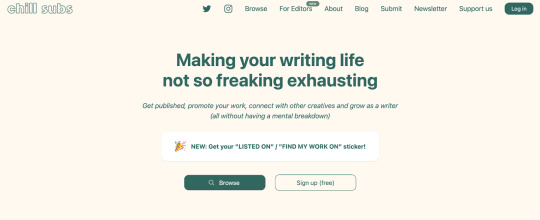
Once you make your free account (which is what allows you to track your submissions, results, etc.), you’ll find this page when you’re ready to start browsing:
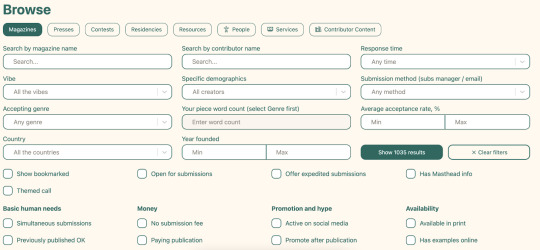
It may seem like a lot, but selecting publication types and finding places that specifically want things like a spooky vibe or a quick response time makes submitting your work so much faster.
Just below this browsing section, you’ll find a list of publications if you just want to select a few without the filters. Here’s a screenshot of the first one I found:
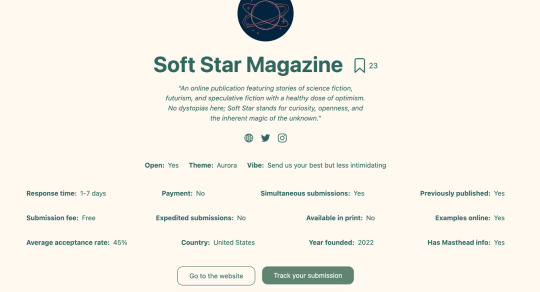
There’s a great summary of the magazine and everything you need to know, like the facts that they have a super fast response time, don’t require a submission fee, and even their acceptance rate!
If you scroll further down under a publisher, you’ll find other invaluable information like:

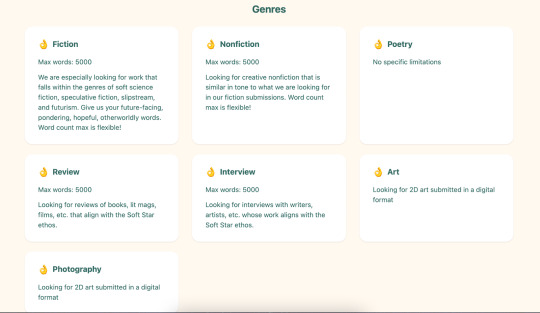
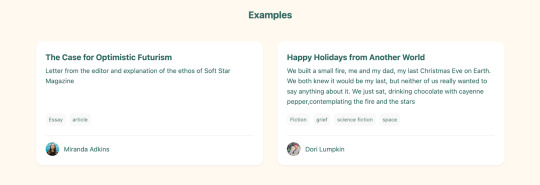
Normally, you’d have to find all of these things by searching a publication’s website and recent published work. It would take much more time and you might not find what you’re looking for (I struggle when I’m too tired or distracted). Chill Subs will connect you to publications super quickly and easily, without charging a dime!
Next, I also like The Grinder, which you can find here: https://thegrinder.diabolicalplots.com/
Here’s what their homepage looks like:
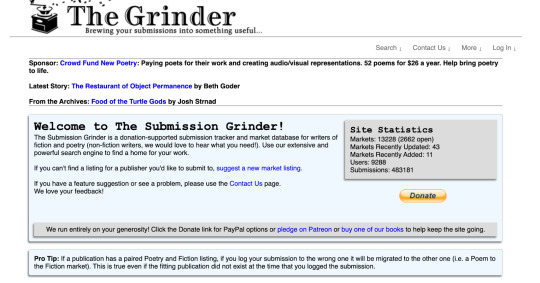
This site is better for people who are more data driven! Right beneath the top of their homepage, you can automatically see the stats for The Grinder users who recently got accepted or rejected. At the time that I wrote this post, the people in the screenshot below had numerous rejections. I find it encouraging to see stuff like this because it’s a reminder that rejections happen to everyone. It’s just a matter of finding the right place for your work!
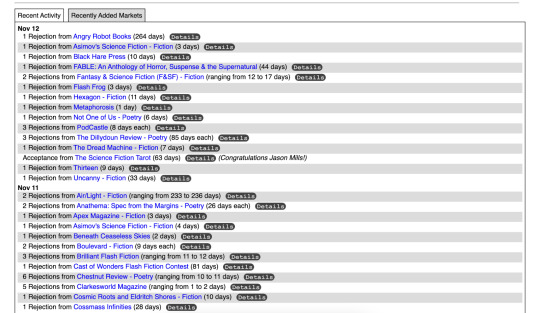
If you select “Search” on the top of the homepage, you’ll get a dropdown menu for things like searching for fiction or poetry submissions, plus publishers listed in alphabetical order.
For the purpose of this post, I’ve selected “Historical” as my imaginary story I’d like to submit. There are many other genres in the box if you keep scrolling. Here’s what the start of this process looks like:


Hit “Search” and this comes up:
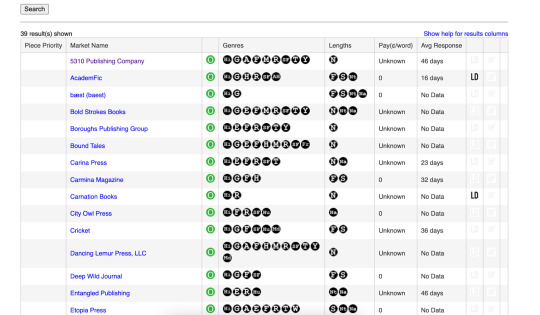
Right away you’ll see what each place pays, which genres and lengths they accept and their response time. I’ve clicked on the first publisher and found this data:
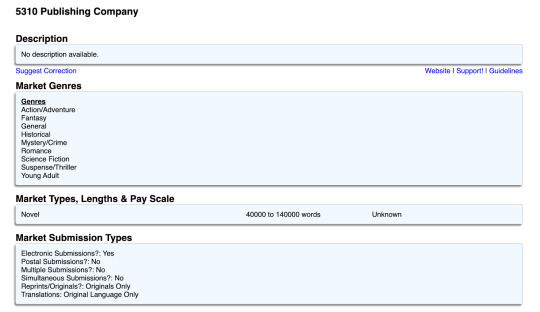

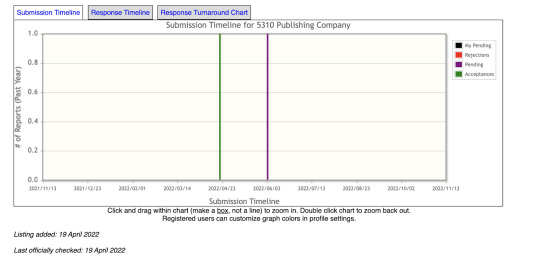
Enjoy using the charts and data to gauge where your stories should go! There are many publications working with The Grinder, so there’s tons to search through as you get a feel for what’s out there.
Other potential places to submit your work:
Submittable: https://manager.submittable.com/opportunities/discover (You’ll need to have submitted to a contest that uses Submittable to make an account, but the Discover tab has many publications organized by closest deadlines.)
Your university literary journals (if you’re a university student—most only accept work from students enrolled in that school, but it’s a major perk if you’re paying tuition because you won’t have to pay to send your work off!)
Local literary journals (many only accept work from writers who live nearby, which narrows down your competition).
4. Keep Track of Your Submissions
If you’re submitting more than one or two stories at a time, it’s best to keep a spreadsheet that tracks your submissions. As your writing career continues, you’ll always be able to reflect on which stories you submitted and where they went. It’s a great way to see how your writing has grown and note which publications you liked the most/had the most success with.
My submissions spreadsheet contains labeled columns for things like:
Date of submission
The story’s title
The page length/word count
The genre
The publication mae
The publication type
URL of publication if applicable
Final date of submissions
Date of notice if one is given
Potential prize money if applicable
Rejection or acceptance when notified
Some places only want unpublished writers, but most only want stories that haven't been previously published or placed in contest results. Keeping track of which stories receive prizes/publications makes it much easier to submit qualifying works in the future.
5. Evaluate Your Publishing Contract
Many publishers require writers to sign a contract so the legal reality of the transaction is clear to both parties. This happens for both short stories and long form work. You’ll have to review things like:
Allowing them to have print rights (typically worldwide because things are published online)
Allowing them to publish your picture and bio that is usually included in the submission form
Allowing them exclusivity (you may need to wait a specific time period before submitting the same story to other publishers/contests or selling it on your website)
Agreeing to author’s warranties (this means you agree that you wrote the story, it isn’t plagiarized, it isn’t libelous, and you don’t want it to be public domain)
Agreeing to a termination clause (the publisher typically reserves the right to terminate your publication contract for things like discovering plagiarism, getting sued for libel, if you sell the story to another publication within their exclusive time frame, etc.)
Agreeing to a reversion of rights clause (you’ll get all of the above rights to sell/submit the story if the publisher doesn’t get your story published by the deadline included in your contract)
Agreeing to payment terms (if you’ll be paid based on how many magazine copies are sold, based on your word/page count, or if you’ll get a flat fee). Also, how you’ll get paid (in installments, within a time frame after publication, via direct deposit or check).
A big thing to note—if a publisher doesn’t include a reversion of rights clause, they essentially want to lock your story within their publishing company permanently. You’ll never get the rights back for submitting or publishing it elsewhere. That includes if you write a collection of short stories and want to publish an anthology—you wouldn’t get to include the story taken by the original publisher.
It’s very important to know your rights as a writer before submitting.
You can read more about contract details over at Writing Cooperative.
And you can always look through Writer Beware, which tracks scams and legitimate publication opportunities.
-----
Hopefully this helps you get started with your next venture in getting published! The process doesn’t have to feel as confusing as it often does. Best of luck! 💛
#writing resources#publishing resources#publishing short stories#writeblr#writers of tumblr#writing short stories#short story resources#writing advice#writing tips#writing community#writing help#creative writing
299 notes
·
View notes
Text
Network Effect, aka the thing formerly known as Book 5 (which is book 6 chronologically now, for some ungodly reason), would be a million time better if it had 80% of it cut out.
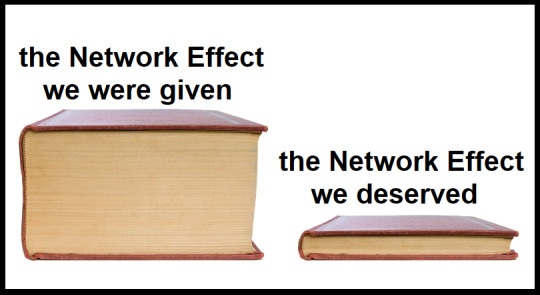
[ID: The meme of a giant book next to a small book. The giant book is labeled, "the Network Effect we were given". The smaller book is, "the Network Effect we deserved". End ID.]

[ID: The "sometimes, things that are expensive are worse", meme, of a person with long hair looking back over her shoulder in a dimly lit room, now edited to say, "Sometimes, stories only work...if they're short.". End ID.]
I hope this is a lesson to aspiring writers that if you want to write a full-length novel...you need to actually have world-building and proper, deep characterization. Otherwise you'll end up with...
[runs to check the page count, realizes it's still in the bottom of the bin and not on the bookshelf yet]
Like, probably 300 pages or something, and most of it's meaningless filler. If you don't have round characters, and don't have any world-building, and therefore no real depth to your setting outside of the plot, then if you have to fill out 300 pages, you're gonna end up wasting a whole lot of time not doing anything but desperately trying to increase the word count no matter how aggravatingly pointless the scene.
The Murderbot Diaries series does not have enough characterization or world building to fill out a novel. So much time is wasted in Network Effect with the character's doing nothing but talking about what the problem is, and not in an interesting way to read.
Sometimes there's just not enough substance to a story for it to be anything except a short story or a short novel at most. If you want to have a book a hundred thousand words long, then you better have something worthwhile to spend them on.
Network Effect, and even the newest System Collapse, which isn't as long, do not have anything worthwhile to fill in all the gaps formed by stretching the story out into a full-length novel rather than a novela.
There's a big difference between 30,000 words, and a hundred thousand words. And if you want your story to be the latter, you better actually have something to write about. It can't just all be useless filler that neither furthers the plot nor develops any of the characters.
And it's literally not a bad thing for stories to be short. Different stories work best with different formats. Full-length novels are not the be-all end all of written stories. What is bad, though, is trying to force stories that do not work in longer forms into those longer forms anyways.
#writing tips#writing advice#writing#described images#accessible memes#described memes#writing a novel#novel writing#short stories#writing short stories
3 notes
·
View notes
Text
Ghosts Have Souls
Darkness. I couldn't bring myself to move.
"You alive?" That was Jesse.
"No, I'm a ghost."
"Ghosts have souls; you do not."
"I will haunt you."
Silence.
"What's going on?"
"Just–everything is so uncertain, and–"
"House rule eight: no hyperbole. Not everything."
"Name one thing that isn't falling to shreds."
"Those curtains seem solid. And… we're solid. You've got me, right?"
"That was cheesy," I deadpanned.
"Fine, I won't comfort you."
"Jerk."
"Idiot."
I couldn't help smiling.
"Now help me get the cake off of the ceiling."
"Wha–"
#short story writing#flash fiction#writing short stories#my short stories#short fiction#short story#what the heck#im not even sure what this is#hope you enjoy it anyway#bye
3 notes
·
View notes
Text
8 Rules of Writing
[This week, I led a session at the Madrid Writer’s Critique Group on important writing rules. My focus wasn’t on broad edicts like “write every day” or “write what you know,” but rather on the more technical rules of writing that elevate one’s work and give it the air of professionalism. This post summarizes that session.]
Artists are rulebreakers. They want to pave the path, not follow it.…

View On WordPress
#8 Rules for Writing#Book writing#Chekhov&039;s gun#Deus ex machina#Fiction#Freelance editor for hire#How to be a better writer#Joseph Lyttleton&039;s rules for writing#literature#Rules of Writing#Writing#Writing books#Writing Fiction#Writing novels#Writing rules#Writing short stories
2 notes
·
View notes
Text
Recovery
Summary: Hermione tries anything to take her mind off of Draco.
Word Count: 451
A/N: Inspired by this quote from Pinterest.
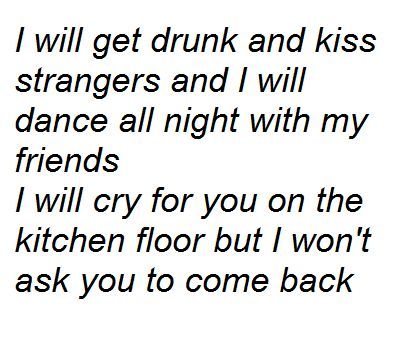
-
When the tongue prodding her mouth slips between her lips, she lets them. The man tastes of firewhiskey, his hands heavy on her hips as he holds her in place against the wall of the club. She’s thankful she wore jeans, the denim stopping his hands from exploring any further.
Hermione winds her fingers into his hair, pulls hard, and then man groans into her mouth. The wall vibrates behind her, making their bodies bounce slightly, the floor sticky beneath her shoes. She inhales, smells the scent of expensive tobacco, and suddenly it's all wrong. Placing her hands on his chest, Hermione shoves at the stranger hard. Caught of guard, he stumbles backwards, his back hitting the wall opposite them. She strides away as he calls for her, ignoring his voice.
Draco smelled of expensive mint, not tobacco. He didn't smoke.
Spying Ginny at the bar, Hermione slid into the seat next to her, waving down the bartender who placed a shot in front of the red head. Ginny held up two fingers, the music blaring, signifying she wanted another shot, and the bartender nodded, disappearing for a moment.
“How was he?” Ginny shouted, and Hermione shrugged, reaching for the shot glass that appeared before them.
“He was alright!” He wasn’t Draco.
Ginny flashes her a smile, raises her glasses. The two witches clink their glasses, before downing the shots in one go.
They dance for hours, Hermione and Ginny taking turns swinging one another around the dance floor. A few men press up against them, hands on their hips and in their hair and they let them, Hermione relishing in the way it feels to be touched, pretending it's him touching her.
Ginny spends the night, crowding in Hermione's bed, asleep the instant her head touches the pillow. Hermione does her best to rest, she’s still drunk, her legs wobbly as she goes into her kitchen to fetch herself some water. She takes a sip greedily, gulping the cool liquid, surprised to find water on her cheeks that isn’t from her cup.
The tears are cold, icy on her skin, and she covers her mouth with her hand, bites into the skin. Scarlet is on her teeth as she sinks to the floor, legs too shaky to hold her.
She had considered calling him many times, the thought flashing through her mind once again. Dragging her knees to her chest, Hermione chased the idea away. She had vowed she’d never beg him to come back, never beg him to love her again. But she had never said she was above kissing strangers, or crying for him on the floor of her kitchen, anything to distract the hollowness in her heart.
8 notes
·
View notes
Text
Han Yu: a retrospective
Late June this year, I started playing a City of Mist game. Before each session, a player will do a monologue, where they will roleplay a story snippet where their character is in the spotlight. Some of the other players started writing their monologues, so I got inspired to write them, too.
The campaign finished earlier this month, and I now have under my belt 6 short stories I feel quite proud of.
What did I learn from this journey?
Likes
I got to expand a lot on Han, developing his backstory etc. much more than if he stayed a character in my game sessions. He developed into a much more rounded character.
The games ran once a week for six months, and I averaged a short story a month. You raise your hand to do a monologue, so there would be a deadline AND an audience, and that is helpful for motivation, and thus putting your craft through more practice!
Speaking of, writing these small pieces is, for me, practice for crafting units of fiction that I can maintain my interest in. Every single one of them, I wrote because I had an idea, raised my hand for the monologue, and then sat down to write them. Every single one I wrote because I felt something, and sat down to capture them.
Why is that special for me? Working on the main novel, there are many chapters that I've written because they're on the outline. I wrote them feeling dragged and dreadful and dull, just to get to the next piece. These I'm sure will undergo heavy rewriting when the draft is done, because the author is the first reader, and if even they are not interested, who will be?
So my aim for future chapters is that each of them should have something memorable, something interesting, something that moves me, a spark of its own. A chapter should never have the shape of just being a bridge to the next interesting thing. That would be a weak point where the reader can go, "fuck this book," and move on.
One more thing I like about writing shorter pieces is that I have something to show. Working on a novel is a long, long task, and as a developing writer, shorter pieces allow for more feedback, and more opportunities to learn and improve.
Dislikes
The stories, though structurally are their own pieces, in the sense that they have a beginning, middle, and end, they rely heavily on story developments only other players in the game are aware of and can appreciate. The parts that I find can be independent from the larger plot, like the Lovecraftian vibe, I don't think are strong enough to compensate for that plot dependency.
It's not easy to get feedback; I mean, even published authors with publishers behind them struggle to get reviews. With this added plot dependency on top, the stories don't have as accessible an audience as it can be, so the pool of potential readers who could fully enjoy them is limited. That's not to say you should try to appeal to as wide a demographic as possible; this does not apply to non-fundamental details. This inaccessibility is with the plot itself, and it's hard to enjoy when you're frustrated where large portions of the plot is not not available.
So while I am getting a lot of practice writing these pieces, and thus learning a lot on what makes them interesting to me, the lack of feedback means that unfortunately, I'm not learning a lot about what works and doesn't for other people.
Conclusions
I'm still gonna play TTRPGs; in fact, I have a game with the same group starting next year. I will still write stories like this, if the game system calls for it, as they are still good writing practice opportunities.
I will start looking into writing more truly standalone short stories; ones that do not require "in-group" knowledge. They will likely still be in serial form, but if a reader read the first to the last, they should have all they need to interpret the plot, instead of having large chunks just be… unavailable.
I have a few ideas in mind.
As alluded to in my previous progress update, I've been thinking of doing an actual play fiction. I love solo RPGs, and created a character that I played a few scenes in. The plan is to play enough to have the session notes for a few chapters, and then use them to produce a serial web fiction.
One other idea I had recently was to write some short stories set in the setting I've built for Impossible Wreck. The setting is large, and the plan I have for the trilogy will not cover everything interesting. Writing short stories covering those areas would also help me flesh out the lore and setting, along with all the benefits listed above.
As for Han, specifically: the campaign is over. Restore is the final story to send him off, and I'm happy with where he is. He's definitely earned it! Onto the next victim!
#writeblr#ttrpg fiction#ttrpg#urban fantasy#city of mist#writing short stories#writing#writing community
3 notes
·
View notes
Link
If you want your short story to be as entertaining and surprising as possible, it is important that you incorporate a twist into your writing. With these short story ideas, you’ll get some great inspiration for putting a twist into your own short stories.
9 notes
·
View notes
Text
After the occupation, the princess was confined to the palace.
Once a month she'd be taken on a walk around the city, heavily guarded of course, to show the people that she still lived. It also served, of course, as a reminder of what they stood to lose if they made trouble. The princess did her best go wave and smile and give the people what encouragement she could.
The rest of the time, her life was spent in musty rooms and dusty towers. She filled most of her time scouring the castle for materials which she would sew into more and more elaborate outfits, which she would show off on the days when she was allowed outside.
Indeed, the public loved their princess and her dresses so much they'd often sketch or paint them along the route and pass the images on so that all could see the princess at least was well.
This pleased the occupiers for two reasons. First: it kept the princess out of trouble. Second: it gave them a reason to sneer and they did love a good sneer.
"What a vain creature she is!" They would remark.
"Doesn't even care we murdered her brothers so long as she gets enough satin to make her little dresses!" They squawked.
This was unfair, of course, for to call her creations "little dresses" was to call Queen Murderfun the Needlessly Genocidal "a tad piquey". Her dresses were gravity-defying wonders lace and pearl. They were thunderstorms captured in velvet and waterfalls summoned in silk. She was a wizard with silk.
Still, she bore their mockery with a tight smile and careful deference.
"Please, good sirs, my home, my people and my city now belong to you. Let me keep, at least, this one last joy."
And they sneered and they crowed most unpleasantly, but they let her keep her sewing room.
Of course, they would have known their mockery to be doubly unfair had they realised the true purpose of the princess's elaborate designs. For hidden in the intricate embroiderings across her gowns, jackets and fans, the princess had encoded secret (and very detailed) messages. When she would go on her monthly walk, the city's loyalists would line the route, sketching down the patterns to decode later.
Thus did the princess transmit all the occupiers' secrets (unearthed while supposedly 'searching the castle for old fabrics') to the city and thus did she build her resistance.
On the day the revolution finally came, she girded herself in armour of thick spider silk and whale bone. She cut a fine figure with a lacy handkerchief in her top pocket and a razor sharp knitting needle keeping her hair up.
As she waltzed through the castle to open the door for her army, the Usurper King tried to stop her and she simply unfolded her handkerchief and showed it to him.
Upon seeing the impossible arcane pattern emblazoned across it, he fell to the floor with blood streaming from his eyes.
She always had been a wizard with silk.
---
Thank you for reading. If you'd like to support my writing, you can do so at https://ko-fi.com/strangelittlestories
#writing#microfiction#short story#flash fiction#wrote this a few years back and finally got round to posting here
12K notes
·
View notes
Text
Exploring the Art of Flash Fiction: Crafting Miniature Masterpieces
In the realm of storytelling, we often associate great narratives with sweeping epics, sprawling sagas, and doorstopper novels. Yet, there exists a unique and captivating art form that defies these conventions – flash fiction. Flash fiction is a genre of storytelling where authors craft entire worlds, characters, and plots in just a few hundred words. In this exploration of the art of flash…
View On WordPress
#Brevity in Writing#Creative Writing#Flash Fiction#Flash Fiction Challenges#Micro Fiction#Short Story Writing#Short-Short Stories#Writing Craft#Writing Short Stories#Writing Tips
0 notes
Text
don't fucking interrupt me when i'm reading my x reader fics it's rude
#× reader#fan fiction#tumblr writing community#tumblr writers#fics#fanfic#wattpad#stories#fandom#booklr#reading#fangirling#spencer reid x reader#stiles stilinski x reader#rafe cameron x reader#spencer reid#stiles stilinski#rafe cameron#imagine#short story#one shot#author#ao3#recommend me stuff#female hysteria#girlblogging#gaslight gatekeep girlboss#girl interrupted#x reader#writers on tumblr
20K notes
·
View notes
Text
”oh so how did you get into writing?-“ no, writing got into me. Actually it infiltrated my brain, starting with the slow takeover of my room with books to the extremely fast claiming of my notes app and now there’s no way to stop it and no way for me to stop.
#short story#writing#poetry#books#fiction#orginal writing#writer#writers on tumblr#writeblr#writing memes#writing humor#writing problems#writer problems#writer stuff#writers life
6K notes
·
View notes
Text
5 Things Literary Magazines Look for in Short Stories
Submitting your work for publication in a literary magazine can be nerve-wracking. They outline what they’re looking for when they open for submissions, but it can seem pretty vague.
Here are a few things they generally look for when searching for the next stories they’ll publish.
1. A Story That Sticks With Their Submission Requirements
Literary magazines plan their editions at least a month in advance, if not more. They may create new editions based on a theme, a seasonal motif, or another connecting idea that pulls every story and visual design together.
Always check the submissions page for their requirements. If a magazine wants to create a spooky edition for October but you submit a heartwarming historical fantasy story that has no spooky elements, you won’t get selected.
Requirements also include essential details like page length, word count, and formatting instructions. The editorial teams know how much time they have to read submissions and how much space they have for selected stories in their upcoming edition. Following these requirements makes you much more likely to get selected.
2. A New Perspective
People don’t buy literary magazines to read the same stories over and over again. They’re looking for new perspectives and points of views in stories that have fresh ideas. The editorial team also doesn’t want to read the same types of stories every time they open for submissions.
You can bring a new perspective or twist on their required themes or story details by thinking outside the box to connect with your readers while bringing something fresh to the table.
3. Vivid Characters
It’s almost impossible to enjoy a story when the characters don’t feel real. You can avoid that by creating character profiles or outlines for your cast. Imagine their backstories or write scenes from the most important moments of their life.
Also, consider what they want from your story’s plot. What’s their goal? What will they learn? Vivid characters are dynamic, so they should grow into a different (possibly better, but not always) version of themselves by your story’s resolution.
It’s also helpful to use free online tools to create characters. I have a huge list on this blog post for generating their faces, mapping their world, and inventing other details so they feel like real people to you and your readers.
4. A Meaningful Purpose
You might write a story just to get published, but that might lead to a story that lacks meaning. Published short stories have some kind of meaningful purpose to make them matter to the editorial team and readers.
Your readers might learn a life lesson from your work or process some shared human emotion or experience through your characters. It’s helpful to consider a theme for your story before writing it so it always has a clear purpose.
5. Unexpected Plot Elements
Readers want to be entertained. Entertaining stories sell magazines. Remember to add a few unexpected plot elements or twists as you’re writing a story with the intent to publish it.
I have a few ideas in this blog post that might inspire you, but you can also create plot twists by shifting your perspective.
If a story has a character who stops to talk to someone in a crosswalk, your readers will likely assume they’re about to get hit by a car or pushed into traffic if the scene has rising tension. Counter their expectations by asking yourself, what’s the opposite of what they’re expecting? Your character might face an oncoming car with a distracted driver by lifting it over everyone as it’s about to crash into pedestrians. Maybe they learn how to fly or lie flat on the road as the car passes over them.
Purposefully thinking about what your readers will expect and choosing to do the opposite is a great way to add unexpected plot elements that also pique the interest of editorial teams.
-----
It’s also important to remember that you’re likely submitting a story alongside hundreds if not a thousand other writers. It depends on how popular or well-known the literary magazine is.
You can write a great story and still not get published because a big part of that experience is getting lucky. You have to hope the right editor who will appreciate your narrative style and story choices will be the one to open your submission.
Sometimes writers take years to get published. Give yourself some grace as you send your work off. Whether or not your stories get accepted, you’re still learning from the process and developing your writing skills. Eventually, your work will shine in the place it’s meant to be.
#writing advice#writing tips#writeblr#writers of tumblr#publishing tips#publishing advice#publishing#short stories#publishing short stories#writing short stories
117 notes
·
View notes
Text
The goblin looked at the orc. The orc looked at the goblin. They both looked down at the crumpled shape of the Overlord, His Unholy Majesty, in his obsidian armor.
His final spasms had been mesmerizingly acrobatic. The fall down the steps leading up to his iron throne had pretzelled his body quite impressively, both arms folded behind his back and one leg bent at a jaunty angle.
The goblin looked at the orc. The orc looked at the goblin.
"Shit," said the goblin.
"Shit," said the orc.
"We're likely to get blamed for this," the goblin said. She walked over to the head of the glittering mangled heap and started pulling the helmet off.
"It's not our fault," the orc said. "It's hard to help someone choking when they wear two-hundred pounds of spiked armor at all times."
"Yeah, well," the goblin grunted. The helmet came free, and the bald head of the Overlord bounced on the stone with a hollow, coconut noise. "You know how it is in this bloody country - thieves get their heads cut off so they can't think about thieving, and all that." She fished in the Overlord's mouth with a finger and pulled out the obstructing olive on the end of her claw.
She popped it into her mouth and chewed. "What do you reckon they do for a regicide?" she said.
"We should run," the orc said. She had started bouncing her leg. "I hear that there's some places in the Alliance where they just kill you and let you stay dead. That's got to be nicer than what'll happen if we stay here."
The goblin started to nod - and then her gaze fell on the helmet.
It looked like a pineapple designed by a deranged blacksmith. It was all thorns and spikes and hard edges, as though the maker had been very determined to not let pigeons roost on it. The only bits that weren't solid iron were eyeholes. Nobody had ever seen the Overlord's face.
She held up the helmet and squinted from it to the orc. One of the thorns had been bent badly in the fall.
Nobody had ever seen the Overlord's face...
"Right," she muttered. "Right. Could work - or."
The orc had a sudden vision of the immediate future. "No," she said.
"I mean you're about his height-"
"No."
"It would just be for a-"
"Absolutely not."
"Just hear me out," the goblin said. "Outside of this room are two-thousand men and orcs and goblins who are absolutely gonzo about this man, and there's a whole country of them outside of the castle, and at any moment someone's going to walk in that door and see one dead tit in black armor and two unbelievably dead idiots next to him.
"Or." She tossed the helmet up like a basketball to the orc, who fumbled and tried to find somewhere to hold it that wasn't a knife's edge. "We chuck him out the window now, walk out the door in the armor, and ditch the armor as soon as nobody sees us."
The orc had started bouncing her leg again. "They'll know something's up the second I walk out of the room."
"No worries," said the goblin. "Leave that to me."
---
It had been a very strange year for the Empire.
Change had rolled across the land as slow and inevitable as a glacier. Roads and bridges carved the gray, blasted wildlands, and a number of social reforms had made the country a place where you could be miserable, yes, but miserable in comfort and safety, and that was an improvement.
Barely anyone got boiled alive in molten metal, and even if the disgusted sun never rose to light the Empire, at least you had a roof over your head to protect yourself from the acid rain.
"Your empire flourishes, Your Unholy Majesty," the magician said over her wine glass. She looked down from the tower's balcony over the gleaming stone battlements. Some work had been done to line the castle and surrounding city with sizzling, crackling alchemical lights at night. The whole thing glowed like something dangerously radioactive.
The suit of armor waved a languid, glittering gauntlet over to the goblin, who bowed.
"His Abominable Gloriousness Thanks You," the goblin recited. "The Prosperity Of His Empire Can Only Be Achieved Through The Prosperity Of His People."
"If I may be so bold, I am quite pleased that you had chosen to take my counsel under consideration," said the magician. "We have accomplished many things together."
Another wave. Another bow. "The Overlord, May His Presence Swallow The Sun And Stars, Thanks You As Well."
"It was quite gratifying to see you change your mind, after so many centuries of denial." The wine was swirled. "Tell me, what was it that finally gave you cause to listen to me?"
There was the slightest hesitation. The goblin's eyes flicked to the armor, then to the magician. She puffed out her chest. "Do you question the wisdom of His Austere Lugubriousness?" she asked.
The magician looked at the goblin. She looked at the armor. She tipped her head back and drank the wine too quickly.
She looked back at the armor. "I know you're the orc, you moron," she said.
The room went deathly still. An alchemical light fizzled.
The orc pulled off the helmet, sending long, untied hair down tangling, and said: "How could you possibly-"
"Because you're both idiots!" the magician said. The goblin jumped. The orc jumped with a noise like a dropped stove. "What kind of a plan was this?! If it wasn't for me, you would have been turned into fertilizer months ago."
She closed her eyes. She took a long, dramatic breath. She set the wine glass down on the balcony rail.
"How did the Overlord die?" she asked when she seemed like she had gotten a hold over herself.
"Choked on an olive," said the goblin.
"Threw his body out the window," said the orc.
"You don't have to mention the window," said the goblin.
"Right," said the orc. "Sorry."
The magician looked out over the city, hand curled thoughtfully under her nose. "Who knows about this?"
"Just us. And, uh. You. Apparently."
"And why did you accept my counsel?"
The orc blinked. "Sorry?"
"Why did you accept my counsel?" the magician repeated.
"Well," the orc said. "Well - you seemed like you had good ideas-"
"Great ideas!" the goblin said with an edge of desperation. "Don't know why the old bastard didn't listen to you!"
"Right - right," said the orc. "And when we figured we were stuck doing this - well, it just made sense, really."
The magician seemed to absorb this. She nodded. "All right," she said, striding between the two and grabbing the crystal decanter.
"Um," said the orc. "Sorry. What happens now?"
"What happens is that you two will continue to serve as Overlord," said the magician. "You will continue to take my counsel. We will continue to reform this bloody country, and gods willing, we will turn it into the crown jewel of the world by next Midwinter."
The orc looked at the goblin. The goblin looked at the orc.
"Really?" the goblin asked.
"Oh yes," said the magician. "I've worked hard to be counsel to the Overlord, and I have no reason to stop now. And besides-"
She looked the orc up and down with a deliberate slowness, poring over every microscopic detail, eyes tracing over every jagged line, and grinned like a panther.
"You look much better in the armor than he ever did," she said. Dark robes swirled like a becleavaged thundercloud, and she strode out through the high iron doors, decanter in hand.
The goblin looked at the orc. The orc looked at the goblin.
"Shit," said the goblin.
"Shit," said the orc.
18K notes
·
View notes
Text
My family probably thinks I'm insane.
So a few months ago I came up with this cool idea for a short story, started writing it, didn't like that beginning, wrote another beginning, and then got distracted by other projects. Then yesterday out of LITERALLY NOWHERE I got super motivated to keep working on this story while riding my bike. So I came home and I printed out my two beginnings (which are actually both good in different ways) and I spliced them together in a different notebook. I was working quietly for a while but then I just had to ask my brother's opinion on a scene, and then I was explaining half of the plot to him, and then I was kinda just yelling about it with him and two of our other siblings (there are eight of us). Later that night I was talking to my older sister about concert tickets or something, but also still writing, and I just said, "so, dystopian corrupt government." She gets scared when I use the word dystopian. I was trying to ask her opinion on a plot factor, but she wasn't all that helpful, so I went back to my brothers' room (they were in bed but not asleep yet) and asked my one brother (same one as before) what I should do, and he actually helped me figure out the plot. At some point I was also explaining to my parents why my character, Jayke, has a y in the middle of his name and ended up feeling stupid (even though I still fully support J-A-Y-K-E, despite what his math teacher has to say). Even later that night I declared to my sister that Jayke is kinda a blob, as in he doesn't have much of a personality yet, he just exists for the sake of it, and to narrate and forfeit his house as a hangout. In explaining this, I needed to give her a rundown of every character and their personality traits. Today I asked my sister for song recommendations from a certain artist that sound like they'd be in an intense movie. Why? I was making a playlist for the story that has apparently taken over my life. Is this normal? It kinda smells like a hyperfixation.
#corrupt distopian government amaright?#i think i need help#writers problems#writing probz#writing problems#writing process#writing funny#funny writing#shortstorywriting#shortstorywriter#short story#writingshortstories#writing short stories#writing shenanigans
5 notes
·
View notes
Text
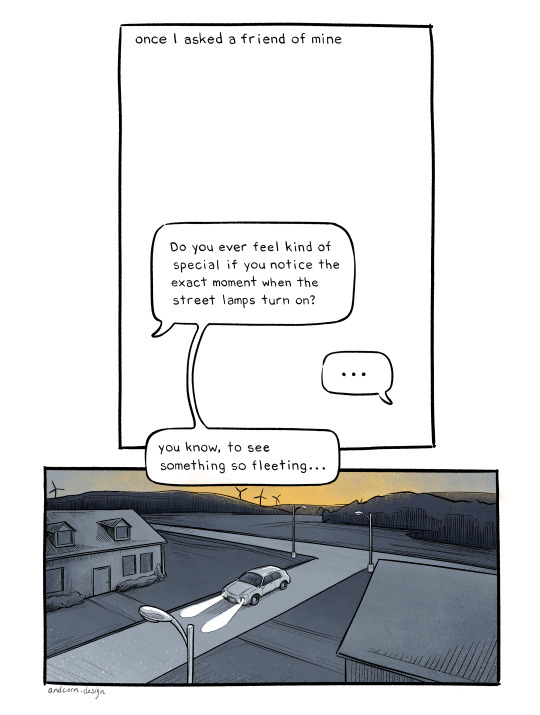

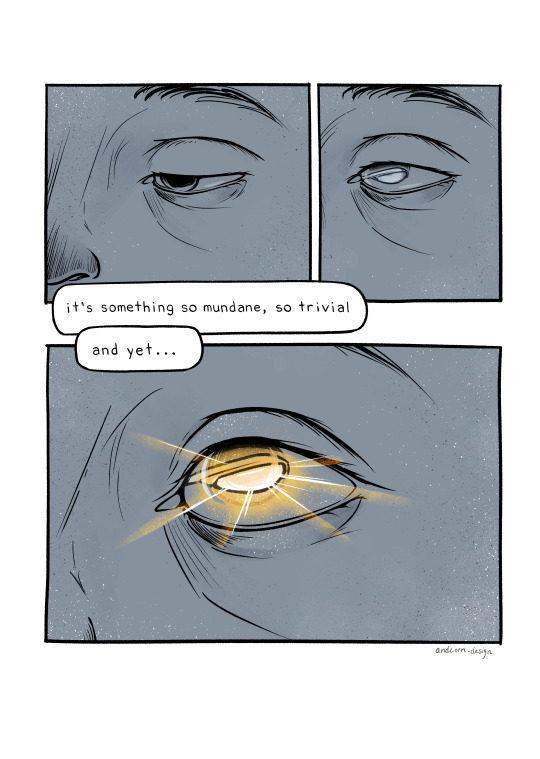
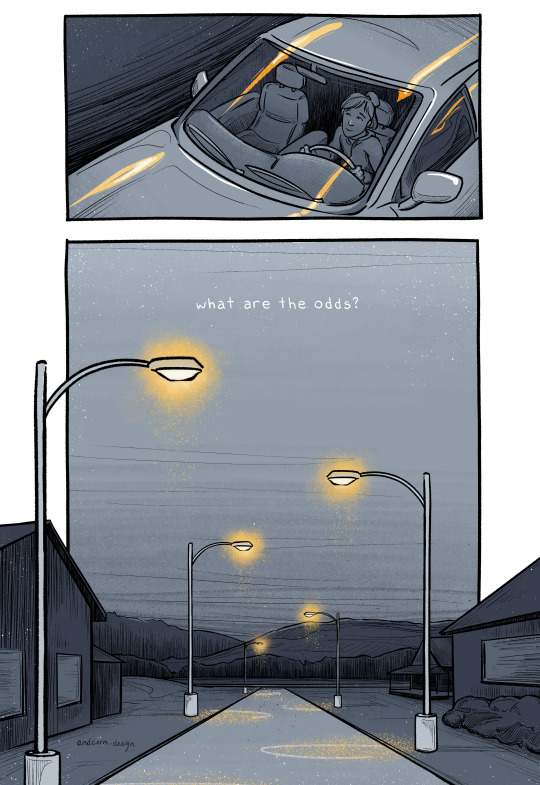
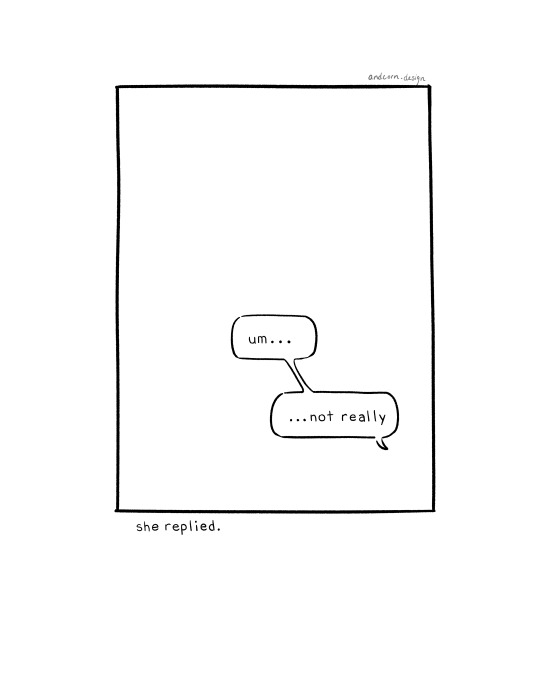
#this was the first comic that i made in this style and i think it's still my favorite#comic#comic art#original comic#web comic#webcomic#illustration#illustrated story#relatable#thoughtful#thoughtful comic#thoughtful writing#writing#original story#original poetry#prose poetry#short poem#illustrated prose#original art#illustrative art#storytelling#relatable story#relatable writing#ramblings#random thoughts#comic artist#illustration artist#amateur poet#poetry art#artists of tumblr
9K notes
·
View notes